
The Weimar Republic, officially known as the German Reich, was a historical period of Germany from 9 November 1918 to 23 March 1933, during which it was a constitutional federal republic for the first time in history; hence it is also referred to, and unofficially proclaimed itself, as the German Republic. The period's informal name is derived from the city of Weimar, which hosted the constituent assembly that established its government. In English, the republic was usually simply called "Germany", with "Weimar Republic" not commonly used until the 1930s.

Maximilian, Margrave of Baden, also known as Max von Baden, was a German prince, general, and politician. He was heir presumptive to the throne of the Grand Duchy of Baden, and in October and November 1918 briefly served as the last chancellor of the German Empire and minister-president of Prussia. He sued for peace on Germany's behalf at the end of World War I based on U.S. President Woodrow Wilson's Fourteen Points and took steps towards transforming the government into a parliamentary system. As the German Revolution of 1918–1919 spread, he handed over the office of chancellor to SPD Chairman Friedrich Ebert and unilaterally proclaimed the abdication of Emperor Wilhelm II. Both events took place on 9 November 1918, marking the beginning of the Weimar Republic.

Theobald Theodor Friedrich Alfred von Bethmann Hollweg was a German politician who was Chancellor of the German Empire from 1909 to 1917. He oversaw the German entry into World War I and played a key role during its first three years. He was replaced as chancellor in July 1917 due in large part to opposition to his moderate policies by leaders in the military.

The German People's Party was a conservative-liberal political party during the Weimar Republic that was the successor to the National Liberal Party of the German Empire. Along with the left-liberal German Democratic Party (DDP), it represented political liberalism in Germany between 1918 and 1933.
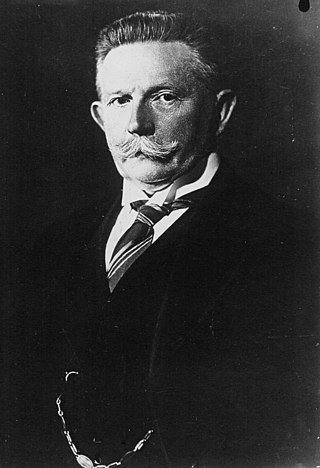
Alfred Ernst Christian Alexander Hugenberg was an influential German businessman and politician. An important figure in nationalist politics in Germany during the first three decades of the twentieth century, Hugenberg became the country's leading media proprietor during the 1920s. As leader of the German National People's Party, he played a part in helping Adolf Hitler become chancellor of Germany and served in his first cabinet in 1933, hoping to control Hitler and use him as his tool. The plan failed, and by the end of 1933 Hugenberg had been pushed to the sidelines. Although he continued to serve as a guest member of the Reichstag until 1945, he wielded no political influence. Following World War II, he was interned by the British in 1946 and classified as "exonerated" in 1951 after undergoing denazification.
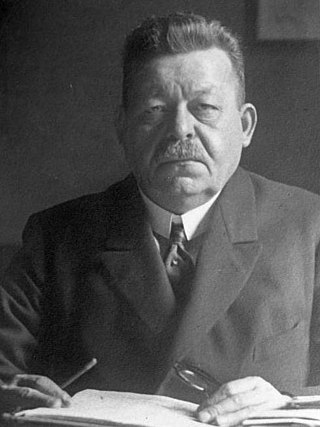
Friedrich Ebert was a German politician of the Social Democratic Party of Germany (SPD) and the first president of Germany from 1919 until his death in office in 1925.

Franz Joseph Hermann Michael Maria von Papen, Erbsälzer zu Werl und Neuwerk was a German conservative politician, diplomat, Prussian nobleman and General Staff officer. He served as the chancellor of Germany in 1932, and then as the vice-chancellor under Adolf Hitler from 1933 to 1934.
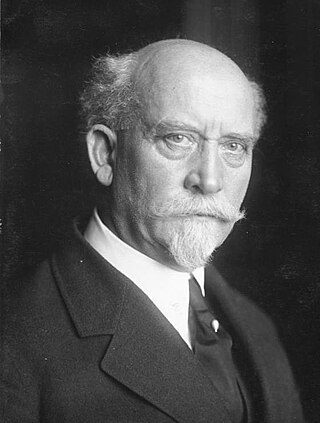
Philipp Heinrich Scheidemann was a German politician of the Social Democratic Party of Germany (SPD). In the first quarter of the 20th century he played a leading role in both his party and in the young Weimar Republic. During the German Revolution of 1918–1919 that broke out after Germany's defeat in World War I, Scheidemann proclaimed a German Republic from a balcony of the Reichstag building. In 1919 he was elected Reich Minister President by the National Assembly meeting in Weimar to write a constitution for the republic. He resigned the office the same year due to a lack of unanimity in the cabinet on whether or not to accept the terms of the Treaty of Versailles.

The Centre Party, officially the German Centre Party and also known in English as the Catholic Centre Party, is a Christian democratic political party in Germany. Influential in the German Empire and Weimar Republic, it is the oldest German political party in existence. Formed in 1870, it successfully battled the Kulturkampf waged by Chancellor Otto von Bismarck against the Catholic Church. It soon won a quarter of the seats in the Reichstag, and its middle position on most issues allowed it to play a decisive role in the formation of majorities. The party name Zentrum (Centre) originally came from the fact that Catholic representatives would take up the middle section of seats in parliament between the social democrats and the conservatives.

The German National People's Party was a national-conservative and right-wing populist political party in Germany during the Weimar Republic. Before the rise of the Nazi Party, it was the major conservative and nationalist party in Weimar Germany. It was an alliance of German conservative, German nationalist, supporters of the German monarchy, völkisch, and antisemitic elements supported by the Pan-German League. Ideologically, the party was described as subscribing to authoritarian conservatism, German nationalism, and from 1931 onwards also to corporatism in economic policy. It held anti-communist, anti-Catholic, antisemitic, and monarchist views. On the left–right political spectrum, it belonged on the right-wing, and is classified as far-right in its early years and then again from the late 1920s when it moved back rightward.

Georg Friedrich Karl Freiherr von Hertling, from 1914 Count von Hertling, was a German politician of the Catholic Centre Party. He was foreign minister and minister president of Bavaria, then chancellor of the German Reich and minister president of Prussia from 1 November 1917 to 30 September 1918. He was the first party politician to hold the two offices; all the others were non-partisan.
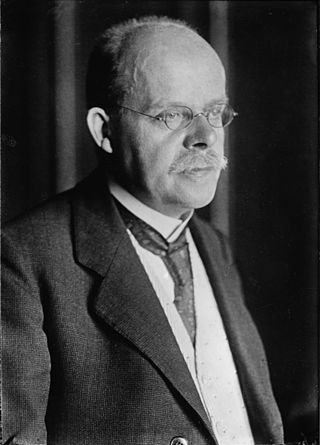
Wilhelm Marx was a German judge, politician and member of the Catholic Centre Party. During the Weimar Republic he was the chancellor of Germany twice, from 1923–1925 and 1926–1928, and served briefly as the minister president of Prussia in 1925. With a total of 3 years and 73 days, he was the longest-serving chancellor during the Weimar Republic.

The German Revolution of 1918–1919 or November Revolution took place in Germany at the end of the First World War. It began with the downfall of the German Empire and eventually resulted in the establishment of the Weimar Republic. The revolutionary period lasted from November 1918 until the adoption of the Weimar Constitution in August 1919. Among the factors leading to the revolution were the extreme burdens suffered by the German population during the four years of war, the economic and psychological impacts of the German Empire's defeat by the Allies, and growing social tensions between the general population and the aristocratic and bourgeois elite.

Carl Wilhelm Severing was a German union organizer and Social Democratic politician during the German Empire, Weimar Republic and the early post-World War II years in West Germany. He served as a Reichstag member and as interior minister in both Prussia and at the Reich level where he fought against the rise of extremism on both the left and the right. He remained in Germany during the Third Reich but had only minimal influence on reshaping the Social Democratic Party after World War II.
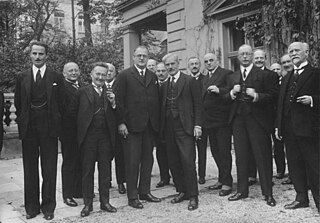
The first Müller cabinet, headed by Chancellor Hermann Müller of the Social Democratic Party of Germany (SPD), was the third democratically elected government of Germany and the second in office after the Weimar Constitution came into force in August 1919. The cabinet was based on the same three centre-left parties as the preceding Bauer cabinet: the SPD, Centre Party and German Democratic Party (DDP), a grouping known as the Weimar Coalition. It was formed on 27 March 1920 after the government of Gustav Bauer (SPD) resigned as a result of the unsuccessful Kapp Putsch, which it was seen as having handled badly.

The Fehrenbach cabinet, headed by Chancellor Constantin Fehrenbach of the Centre Party, was the fourth democratically elected government of the Weimar Republic. It took office on 25 June 1920 when it replaced the first cabinet of Hermann Müller, which had resigned due to the poor showing of the coalition parties in the June 1920 elections to the new Reichstag. The 1920 Reichstag replaced the Weimar National Assembly, which had served as Germany's interim parliament and written and approved the Weimar Constitution.

The second Stresemann cabinet, headed by Chancellor Gustav Stresemann of the German People's Party (DVP), was the ninth democratically elected government of the Weimar Republic. It took office on 6 October 1923 when it replaced the first Stresemann cabinet, which had resigned on 3 October over internal disagreements related to increasing working hours in vital industries above the eight-hour per day norm. The new cabinet was a majority coalition of four parties from the moderate left to centre-right.

The second Marx cabinet, headed by Wilhelm Marx of the Centre Party, was the 11th democratically elected government during the Weimar Republic. It took office on 3 June 1924 when it replaced the first Marx cabinet, which had resigned on 26 May following the unfavourable results of the May 1924 Reichstag election. The new cabinet, made up of the Centre Party, German People's Party (DVP) and German Democratic Party (DDP), was unchanged from the previous one. The three coalition parties ranged politically from centre-left to centre-right.

The third Marx cabinet, headed by Wilhelm Marx of the Centre Party, was the 14th democratically elected government during the Weimar Republic. On 17 May 1926 it replaced the second Luther cabinet after the resignation of Chancellor Hans Luther (independent) four days earlier. The Reichstag had passed a vote of censure against him for supporting a decree that permitted flying a German trade flag with the colours of the former German Empire in certain mostly overseas locations. The new Marx cabinet was a four-party centrist minority government.

The Papen cabinet, headed by the independent Franz von Papen, was the nineteenth government of the Weimar Republic. It took office on 1 June 1932 when it replaced the second Brüning cabinet, which had resigned the same day after it lost the confidence of President Paul von Hindenburg.


















